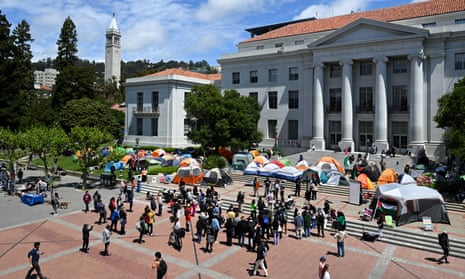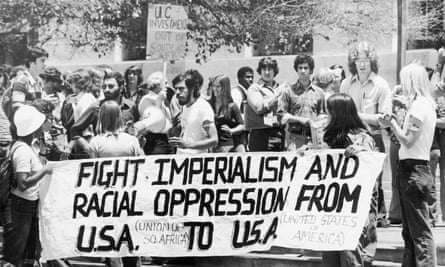A new generation at UC Berkeley pitches its tents

"Rows of tents line the steps at Sproul Hall, the grand neoclassical administration building that soars up nine stories near the main entrance to the University of California, Berkeley.
Thursday marked the fourth day of the Free Palestine Camp, one of dozens of sit-ins that have sprung up on campuses across the US as symbols of protests for a student-led pro-Palestinian movement.
“We are doing what we can do,” second-year PhD student and organizer Yazen Kashlan said over the sounds of a crackling loudspeaker booming recordings of Palestinian support through the adjoining plaza. ‘To what extent the university is ready to budge, that is what we are figuring out. We got into this because we don’t know.”
The protesters have set out clear demands. They want the university to vocally condemn the violence in Gaza, call for an end to it, and to disclose and divest all University of California financial holdings connected to the conflict. They’re particularly focused on the $427m investment portfolio of the school’s endowment with BlackRock, a global asset manager the activists say has holdings in weapons manufacturers. They also want UC Berkeley to academically boycott Israeli universities (including ending a summer internship program held there) and create a permanent Palestinian studies program.
UC Berkeley has said a change in its investment strategy is not on the table.
But the school has budged before.
The steps of the Sproul Hall have long served as the backdrop for movements at the university that have been etched into history, a legacy the school now claims with pride. This plaza hosted student protesters who gathered in the 1960s to fight for their rights to free speech. It was here that Martin Luther King Jr called for a “revolution of values” whileaddressing thousands who had gathered against the Vietnam war and in support of the civil rights movement. It’s where the South African anti-apartheid movement on campus was staged in the 1980s.

Today, the Free Speech Movement Cafe serves salads and sandwiches from within an undergraduate library. And across the plaza, the Martin Luther King Jr student union flanks a main entrance to the campus.
That history drew some of these students to this university and it’s helped inspire some of the actions they are taking now – even if the outcome remains unclear.
In recent days, college administrations across the US have called on law enforcement to clear encampments on their grounds. There have been no such actions yet at UC Berkeley, but in the past the university has at times responded to protests with a heavy hand. When tents lined this plaza for Occupy Cal, a subset of the widespread Occupy Wall Street movement against vast American economic inequality, it was brutally raided by police.
For as long as activism has thrived at the school, so has pushback against it.
“There is a load of irony in UC Berkeley branding itself now as the ‘free speech’ university since it was a movement against the university effort to shut down political organizing on campus,” UC Berkeley law professor Jonathan Simon said.

As a law student at Berkeley in the 1980s, Simon was involved in the movement to end apartheid, with similar calls for university divestment from companies connected to South Africa. Students erected a symbolic shantytown on campus to showcase the impoverished conditions Black South Africans were subject to, inciting a fierce response from police. Simon was among the first of hundreds who were arrested, an experience he said was incredibly frightening.
But in the end, the University of California system acquiesced, divesting more than $3bn from companies in business with the apartheid government. The hard-fought successes of that movement seeded the one alive today, in support of Palestinians. Still, Simon said there are key differences.
“We are in a very different place with Israel and Palestine and the timing is probably not going to be similar,” he said, noting that apartheid leaders were already looking for exit ramps when students’ actions ramped up attention on the issue. “If there is a future for peaceful resolution in Palestine, it’s a long way off,” he added.

But actions taken against the violence in Gaza have also garnered far more passionate support – and criticism – and inflamed tensions heavily tied to identity and culture on campus and across the country.
While the protesters say they are backed by a diverse coalition and have worked to assuage fears felt by Jewish members of the campus community, some students and faculty have felt targeted. Some acts of protest have left the campus even more deeply divided – an issue the anti-apartheid demonstrators did not have to grapple with.
In February, a pro-Palestinian protest of an Israeli speaker brought to campus by self-identified Zionist groups turned violent and had to be rescheduled after a door was broken down and a window shattered. The school was heavily criticized for not better protecting the event and UC Berkeley is now one of six universities undergoing an antisemitism inquiry from the Republican-led House education committee, along with an investigation by the US Department of Education.

In April, a Palestinian American woman affiliated with the protest movement attempted to speak out at a dinner for students held at the home of the dean of the university’s law school, sparking a media firestorm examining the limits of free speech and death threats targeting those involved on both sides.
Simon, who is Jewish, says he understands the fears felt by Jewish and Israeli members of the community, along with the genuine heartbreak expressed in the pro-Palestinian movement at the atrocities committed against civilians in Gaza.
“A huge portion of these folks, including Jewish young people like my son, are protesting hard for Palestine in the name of human rights and a basic dignity that should be accorded to all people,” Simon said. “[The students] are acting within the institutional space that they have the most stake in right now. That is completely legitimate.”
While the Berkeley encampment itself is largely tied to the broader protest movement spreading across universities throughout the country, the students’ demands for the university to divest from companies tied to Israel and the war effort has been years in the making.
“It’s really powerful what’s happening here,” said Henry Norr, a 78-year-old Berkeley resident who was passing out Free Palestine stickers to observers idling near the protest on Tuesday. Norr, who is Jewish, dedicated his life to supporting the Palestinian cause after a trip to Gaza in the early aughts. He was fired from his job as a tech reporter for the San Francisco Chronicle in 2003 for demonstrating against the Iraq war, and has since spent the decades trying to spur public action alongside UC Berkeley Divest, a coalition of students, faculty, alumni and staff that has long called for the institution to end all financial ties to Israel and weapons manufacturers.
“In some ways I feel like it’s a vindication,” he said of the student movement that’s grown out of the years-long effort. These students have helped elevate the issue in a way that gives Norr hope that a change is coming.
Joseph Anderson, a lifelong activist and former Berkeley student who was involved in the anti-apartheid protests of the 1980s, has also watched proudly.
“This is the new anti-apartheid movement, for this generation,” he said. He also believes these protests will leave a lasting impact – like the cause he fought for decades before – even if it takes time. “Even two years before the fall of apartheid in South Africa, I don’t think most of the activists knew that just a few years from then Mandela would be walking out [of prison],” he said. “As we came closer to the end, the end kept accelerating.”
He is hopeful that the students will continue to carry the mantle for as long as it takes. “People in my generation are still active here,” he said of the long history of activism at UC Berkeley. Even after backlash that’s stretched through the years and through the movements, he believes in the resolve he’s seen in the student protesters of today. Even as threats mount, he said, “they’ll just come back stronger.”
Dan Mogulof, a spokesperson for the university, said officials are not entertaining the idea of changing their investment strategy and are not commenting on whether the other protest demands will be met. Instead, he said, UC Berkeley has taken steps to fund “programs and initiatives that would help change the culture on campus”, investing $700,000 on proposals that promote civil discourse.
Mogulof took issue with the characterization that this protest parallels the previous ones staged on the steps of Sproul Hall.
“These protests and these days are very different from days past,” Mogulof said. “It is not the students united against the administration, as was the case in the early days with the free speech movement. It’s not the students united in opposition to a war or to apartheid – we now have student-on-student, faculty-member-on-faculty-member [aggression].”
The tensions, he added, rooted in religion, ethnicity, nationality and identity, have amplified strong emotions and divisions in a way that imperils dialogue – the lifeblood of a school and community that claims it is dedicated to open expression. “We are built for a world that’s painted in shades of gray – not black and white.”
Mogulof also stressed a different vision of Berkeley’s activist legacy, framing the historical events as evidence of the institution’s support of discourse and diversity of perspective. “The university has to be politically neutral,” he said. “Our most essential value is that every student – regardless of who they are and what they believe in – should feel safe, respected and welcome at all times in all places at the university.”
While other demonstrations, including those at USC and Columbia, have resulted in brutal crackdowns by campus police, Berkeley’s protest has continued peacefully. But Mogulof added the school is ready to step in should campus life be disrupted by the demonstrations during the last three weeks of the semester.
“We are keeping a careful watch,” Mogulof added, saying that lines of communication with the protesters are also being kept open. “We will do whatever we can so that teaching, learning, and research continue at UC Berkeley unimpeded and uninterrupted.”
The student protesters for their part are willing to see it through. They are hopeful the school continues to support them. “So far it seems this conflict is so ridden with tone-deafness,” Kashlan said, commenting on UC Berkeley’s history of grassroots activism and how differently today’s protesters feel their cause has been treated. He added that the group has worked hard to “address any threats or fear that our Jewish classmates may feel”.
“The university is showing us they don’t see things the way half the world sees them,” he added. “We are not sure where that may go in terms of talks with the school but we will be here until our demands are met.”
No comments:
Post a Comment